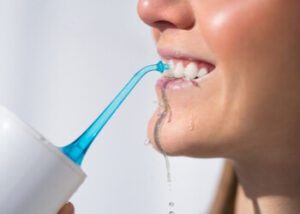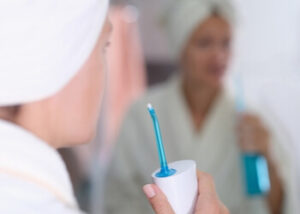Flossing features in the top six dental tips that the Australian Dental Association recommends to the general public, and it’s second only to brushing. That’s because even if you brush twice a day, and use an antibacterial mouthwash you won’t be able to remove plaque from all surfaces of your teeth. And with decay being the leading cause of tooth loss, there’s no reason to take a chance and avoid flossing. But so many patients still avoid flossing. Water flossers are a relatively new innovation, designed to make light work of a job that so many people dislike, but do water flossers work? Let’s take a look at the facts.
How Do Water Flossers Work?
A water flosser or Waterpik is a handheld device that is directed towards your gums. A Waterpik uses jets of water to clean the spaces between your teeth and below your gum line, which are too small for even the finest bristles to reach, in order to remove plaque. It’s not a substitute for brushing, even though it does go a step further than traditional string floss, it’s designed to complement and improve your oral hygiene.
Do Water Flossers Work More Effectively Than String Floss?
Well, that depends on the person asking the question and doing the work. While comparative studies looking at string floss and water flossers find them to be relatively similar in their ability to remove plaque, they certainly are more effective for some people.
 Bleeding gums
Bleeding gums
Some patients have sensitive gums that bleed when they attempt to use string floss.
While some people may find waxed string floss more comfortable, others find string floss to be too abrasive on their gums.
If you have sensitive gums that bleed easily, you can still remove plaque from your mouth if you opt for a water flosser.
Compromised mobility in your hands
Other patients may not be able to use the correct technique with string floss because they have limited mobility in their hands. Patients with arthritis or Parkinson’s disease, and those with carpal tunnel syndrome may not be able to use their hands and fingers with the same dexterity as others.
Water flossers are simple to use: all you really need to do is hold the device and direct it towards your gum line.
Patients with gum disease
Even if you think you’re pretty good at flossing, your technique is still subject to human error, and the time you have available. If you have gum disease you can’t take any chances with not flossing well enough, as plaque and bacteria overgrowth can make gingivitis or periodontitis unmanageable.
Furthermore, patients who have periodontal pockets need deeper cleaning than what is offered by string floss. A water flosser has the capacity to clean the pockets more thoroughly and more deeply and can help you to keep bacteria in your mouth under better control.
Patients who have lost teeth
If you have lost teeth due to dental decay, then plaque removal is something you want to take seriously. It’s possible that your flossing technique wasn’t as well developed as it could have been, and a water flosser may help you to improve your standards of plaque control.
Patients who have tooth implants and dental bridges may benefit from a more targeted way of keeping their teeth plaque-free by using a water flosser. Water flossers are really effective at accessing those hard-to-reach spaces around a dental implant or fixed dental bridge.
Patients who wear braces
People who wear orthodontic braces face a conundrum: you really need to take oral hygiene very seriously and keep your teeth clean to avoid decay and tooth discolouration because of your braces, but wearing braces can make it more difficult to brush and floss. That’s because of the brackets and wires that are placed over your teeth.
Anyone who has worn braces knows how difficult it can be to remove plaque, food and debris from their orthodontics, but using a water flosser can make this process so much easier, quicker and more effective at plaque removal.
Kids benefit from water flossers
Parents find it quite stressful teaching their kids about oral health and hygiene. Kids generally don’t want to brush their teeth when they’re supposed to and teaching them the correct technique takes some time.
 When you need to add flossing into their oral hygiene, it’s even more complicated with a tiny piece of string that young children haven’t developed the fine motor skills to control.
When you need to add flossing into their oral hygiene, it’s even more complicated with a tiny piece of string that young children haven’t developed the fine motor skills to control.
If you start with a water flosser, you get peace of mind that plaque is being removed, and you don’t have to worry about whether their technique is effective or not. Starting out with a water flosser gives your child a general idea of what they need to do, without the stress of worrying about whether it’s actually effective. Once they have mastered the technique with water flossers, it’s much easier for them to start using string floss, if they aren’t already sold on the convenience of a water flosser.
Should You Floss Before Or After Brushing?
The good news is it doesn’t really matter whether you floss before or after brushing. What’s more important is that you do it. Flossing first means you can loosen the plaque and any debris that you don’t remove can be brushed away. If you brush first you may be able to soften the plaque, making it easier to remove when you floss. As long as you floss every day, you’re doing a more effective job to remove plaque than not doing it at all.
For more information on ‘do water flossers work’ or the best water flossers for your family, it’s best to speak to your dentist. Please contact us for a convenient appointment: (02) 8806 3799.
References
What is a Waterpik?
https://www.webmd.com/oral-health/what-is-waterpik
Waterpik Vs. Flossing: Pros and Cons
https://www.healthline.com/health/dental-and-oral-health/waterpik-vs-flossing
Should You Consider A Waterflosser?
https://www.colgate.com/en-us/oral-health/selecting-dental-products/should-you-consider-a-water-flosser
6 steps to a healthy smile
https://www.teeth.org.au/six-tips-for-caring-for-your-oral-health










